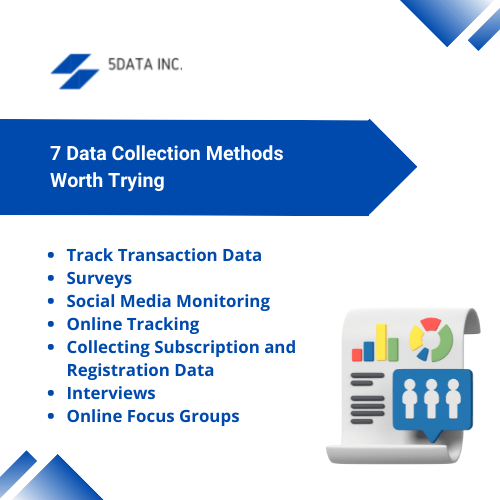What is Online Data Collection?
Online data collection in its easiest form is the collection of data through online modes via various methods like emails, interviews, surveys, texts, etc.
Data collection in its online form is a systematic process with clear distinctions in how data is compiled. Panels set up to collect data must be discreet and knowledgeable about the domain in which research is being conducted. Therefore, certain approaches must be followed to obtain accurate data. These data collection strategies guide your business intelligence strategy and roadmap. Continue reading this article to discover different ways to implement your business ideas.
5DataInc, the best software application development company, helps you identify, reach and communicate with your target audience and maximize your BI decision-making strategy

7 Data Collection Methods Worth Trying
Thanks to the current online landscape, that gives a scope for various data collection tools that are not just cost-effective but powerful and innovative.
Track Transaction Data
Whether you deal in-store, online, or both, your marketing data can provide valuable insight into your business. This data may come from a web store, a third party with an e-commerce assurance, or any POS system in the store. The gathered information tells you how many commodities you sell, what types of commodities are most popular, how often users generally shop from you, and a lot more.
Surveys
Surveys are another impressive method to solicit information straight from your customers. You can use them to accumulate qualitative and quantitative data or both. A survey ballot consists of a list of queries or questions the respondent can answer in one or two phrases, often giving the respondent a list of potential answers to choose from. Surveys can be accomplished online, by email, phone, or in person. One of the most straightforward ways is to create an online survey hosted on your site or by a third party.
Social Media Monitoring
Social media is another great basis for collecting raw data. Explore your supporter list to see who follows you and what you hold in common to get a better idea of who your target audience should be. You can also observe your brand’s mentions on social media by digging for, setting alerts, or using third-party social media monitoring software. Many social media sites also offer analytics on the performance of your social media posts. Using third-party tools may provide even greater insight into the performance of your business.
Online Tracking
If you have a website or an app for your company, they are amazing tools for collecting valuable data. As many as forty data points are created when someone scans your website. By accessing this data, you can see how many clients visit your website, how long they linger, what they click on, and much more. Website hosting providers can collect this type of information. You can also use business analytics software (Google Analytics) or place pixels on websites to set and read cookies so that they can track user behavior that provides valuable insights.
Collecting Subscription and Registration Data
You can collect data by offering them coupons, and promotions, in return for customers providing valuable information. Making people subscribe to blogs or websites is an essential marketing technique. One of the benefits of this method is that prospects are more likely to convert because they are actively showing interest in your brand.
The data obtained from subscriptions can give valuable insights into whether the promotions are fruitful- the number of subscriptions, purchases made, which page they subscribe from, etc.
Interviews
Interviews are a proven method of collecting qualitative data and have many advantages over other types of data collection. Interviews can be conducted over the phone in person using a trusted cloud, hosted PBX system, or via video call. Freedom in interviews is another area of advantage for any business. You can hold unstructured, structured, or semi-structured interviews per your need.
Online Focus Groups
A moderator interviews a large group of pre-screened individuals through a secure site or web conference. The feedback and comments from the consumers form valuable insights regarding the company. Online focus groups obtain qualitative data and collect information regarding products, services, customers’ opinions, beliefs, perceptions, etc.
The advantages of online focus groups are that the survey can be conducted worldwide, and people who participate need not travel, contrary to traditional focus groups. Google Hangouts and Zoom are popular and secure tools for organizing online focus groups.
Some Additional Tips
- A business integrator needs to know the starting point and where each business unit or department should be on the BI technology map.
- Of course, data protection measures depend on good security, but more is needed to ensure that personal information is stored carefully and used appropriately.
- Good management does not guarantee subordination with specific legal or code of conduct requirements. Hence, it is difficult to ensure an organization is upholding it without an effective management process.
- Understanding the difference between making the right decisions and making them the right way will help you confidently take the next steps in the BI implementation process.
- BI must be all-encompassing, not just restricted to IT. Business users frequently need real-time, actionable knowledge and reports, and they cannot wait for IT to develop the reports.
Conclusion
Apprehending the different data collection methods will help you determine which method best fits your program, budget, and the questions you desire to answer. Combining multiple data types diminishes problems and helps make better business decisions. 5DataInc is the best data collection and data management service provider. Their predictive analytics and machine learning, using scientific processes, algorithms, and systems to extract knowledge and insights from data, will surely help your business.

Annanya Adyasha
Author
